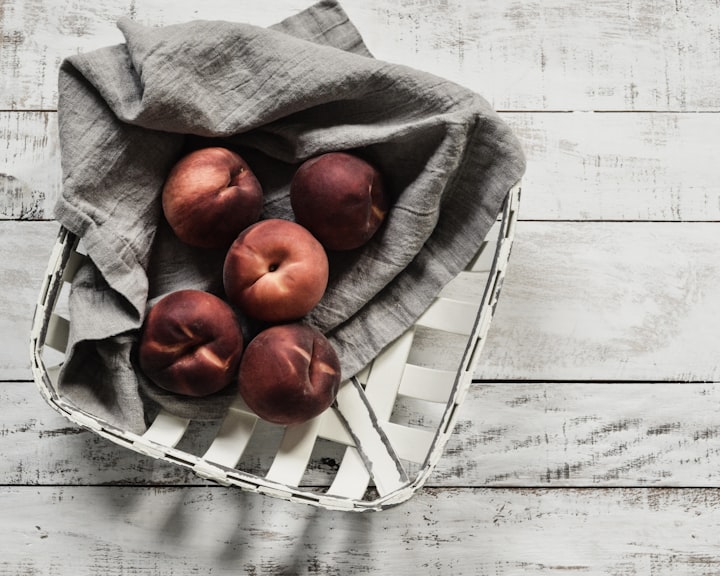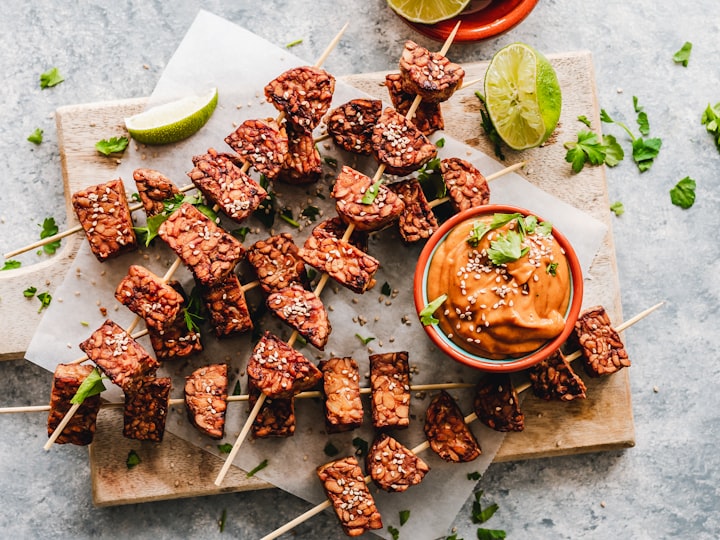Peach Vignettes
A summer love story

I read once about a wealthy man who loved grapes. He had everything money could buy so he relished the effort that a certain friend took to track down different grape varieties to bring him when she visited. This was how she showed her love, he said.
With me, it's peaches.
***
On my last trip to Colorado, I stayed with my best friend for a week. She insisted on taking me to her favorite Italian restaurant: Pizzeria Locale.
"I know you love peaches," she said,"So I'm taking you there for the peach pizza." I muttered something about ruining good peaches.
"The peach pizza is our favorite thing on the menu. Just try one slice," my friend said. "I'll order something else and if you don't like it, we'll swap."
Colorado's Front Range is known for peaches. I fell in love with the fruit during my ten years in the state. Tables at the local farmer's market overflow with peaches in July and August, so ripe the sweet juicy scent fills the air, and even on a student's budget, I could afford to eat as many as I wanted.
I love the whole sensation of eating a peach. Cupping it in my hands, feeling the skin's fuzz, anticipating that first bite when juice runs down my chin and I slurp the flesh. I can't eat a peach quietly.
The pizza, when it finally came, was made with grilled peaches, goat cheese, red onions and balsemic reduction. It took peaches in a new direction for me.
There was no swapping.
***
I stayed with a friend in Denver.
She would make coffee for both of us and breakfast for her two kids. She'd ask me what I wanted to eat, and I'd always reply that I was happy with peaches and coffee. She'd laugh and make herself fried eggs with a tortilla.
"Do you realise you've eaten three pounds of peaches since you came?" she said, teasing me. "My kids don't get through that much in a month."
Since I was leaving in a few days, she went shopping and bought me more peaches.
"Do you want extra peaches to take back with you?" she asked me.
***
I go every year now to visit my father and my step-mother on the East Coast. Dad's birthday is in August. He'll be 94 this year and I haven't missed a celebration since he turned 90. He's healthy and his side of the family is long-lived, but I feel as if time may run out even with his remarkable genes.
I'm immensely grateful that Dad's birthday also happens to fall during peach season.
Peaches is how I first knew that my stepmother cared about me. She married my father decades after my parents divorced and I left home, and it's only in recent years that I've gotten to know her. She is English and I had always thought her careful ways of speaking and acting around my brother and I—and minimal emotional expression—was due to British—and generational—reserve.
In the beginning, her emails ended "affectionately yours," then "with love," but many people write that way. I didn't know how close our relationship actually was.
My father was a physicist in his working life. He revels in precision, theorems proven, mathematics. When faced with a problem that can be calculated, his face lights up and he grabs a pen and a yellow pad of paper, of which there seem to be an endless supply around his house.
I'm messy by comparison. I rely on intuition, on figuring things out as I go along. I'm a writer. I tell stories. I'm studying psychology. Talk about your imprecise science. I've always suspected I am a puzzle to my father, with my exuberant lack of precision and my willingness to settle for grey areas and unclear boundaries.
My stepmother is the perfect match for my father. In her kitchen, there are all sorts of tools for measuring, weighing and counting, and even a kettle that boils water at different temperatures for different types of tea. No throw in a pinch of this or that—which is how I cook. There is a glass butter holder for eating—which stays on the table from breakfast to dinner, after which it's returned to the fridge—and there is a second container used only for cooking, and which stays solely in the fridge. The table butter has crumbs. The cooking butter does not.
When I came for Dad's 90th birthday, my stepmother matter-of-factly mentioned that there was a bowl of peaches for me in the kitchen. On a previous trip, I'd eaten several pounds of them, and she remembered.
The peaches—every single one—were ripe, juicy and without bruises. Dad told me she'd picked over them carefully at the local farmers market because she knows how much I love peaches.
Every August, there is a bowl of ripe peaches waiting for me when I arrive.
My stepmother is a museum curator. She's also a culinary artist. She made a modern Middle-Eastern dish by English chef and cookbook writer Ottolenghi on that 90th birthday trip and I loved it. Now when I visit, she dips into Plenty or Flavor for dinners. They require hours in the kitchen to prepare and—notoriously—can have as many as 20 ingredients.
Once I went to a talk by Ottolenghi at the Ubud Food Festival. I bought a copy of Simple and asked the chef to dedicate it to my stepmother and why. "You really should learn to cook these dishes yourself," he said, scolding me. "That's why I wrote this book."
"But that's how my stepmother shows her love," I said, "By feeding others." And I realised, as I said it, that it was true.
On my last visit—Dad's 93rd birthday—my stepmother served a dessert of baked peaches with spices. Perhaps it was the strong red Georgian wine we drank with dinner, or the fact that we'd spent the most time together ever that trip, but suddenly she pushed her chair back from the table and started talking about her childhood. The words flowed out, about being an only child, lonely, neglected and terrorized by a cruel, distant mother. My Dad just nodded. He'd heard the stories before. Wow, I thought, I wouldn't show my true feelings either.
The next morning, my stepmother was embarrassed. I told her the story made me feel closer to her, not the opposite. I understood why she communicated through actions instead of words. The Ottolenghi dishes and the peaches had already shown me.
She cried at the airport when I left.
***
My daughter Elle has grown up in Indonesia. When she was 12, I went to Singapore on a visa run and came back with a kilo of peaches imported from China. I wanted to share my love of peaches with my daughter.
Peaches won't grow in the tropics; they need a temperate climate. They originated in China which still supplies 60% of the world's peach supply.
Most of the Singapore peaches never became properly ripe—peaches have a short shelf life—and they had that mealy texture of gas-ripened, picked-green fruit. But two—enough for one each—were divine. I'd put them in the sun on my kitchen windowsill to remedy the early picking and gas, and the sun did its magic.
Elle bit into one of the ripe peaches, and juice dripped down her chin. Her eyes widened. Wiping her chin with the back of her hand—and ignoring me telling her to use a napkin—she tried to categorize the flavour: "It's sweet like mango, but not as sweet, and juicy like rambutan, but the taste is different. More like mangosteens, which are my favorite. Now I see why you're always going on about peaches," she said, eyebrows raised, with a slightly bemused, all-knowing look that only a twelve-year-old can pull off.
***
About the Creator
Liz Sinclair
Amateur historian who loves travel and lives in Asia. I write 'what-if' historical stories, speculative fiction, travel essays and haiku.
Twitter: @LizinBali. LinkedIn: sinclairliz






Comments (1)
Lovely!!!💖💕